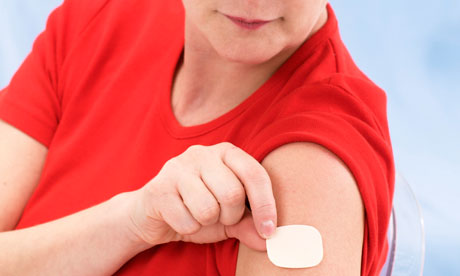
Some women dread the menopause, but others find it liberating – no more worries about contraception. While it's a natural part of life and not a disease, many women do get symptoms that are unpleasant.
What is the menopause?
The menopause means the end of periods and a fall in the amount of two hormones that the body produces – oestrogen and progesterone. It's the drop in the levels of these hormones that cause many of the symptoms of the menopause. The average age for the menopause is 52. If it happens before you are 45 this is considered an early menopause.
What are the symptoms?
For a year or more before the menopause women often find their periods change – they may become less frequent and be heavier than usual. Eight out of 10 women get symptoms of the menopause, such as hot flushes (you may go red and feel suddenly overwhelmed by heat), a dry vagina (making sex uncomfortable) and have difficulty sleeping. You may put on weight more easily, have mood swings (although the menopause often happens at a time when your life is changing anyway) and more headaches than usual. You will, due to the hormonal changes, have an increased risk of osteoporosis (bone thinning) and heart disease.
What can I do to treat it?
You may not need any treatment – it depends how bad your symptoms are. Hormone replacement therapy used to be widely advocated as the answer to the menopause, but research has shown that it can increase the risk of heart disease, stroke and breast cancer.
The BMJ's health information for patients is good at outlining the exact numerical risk for these events. For example for a stroke you'd expect two women in 100 over 60 who are not taking HRT to have one, but it is three out of 100 women who are taking HRT. You should talk to your doctor about your risk – which may be higher if you have a family history of heart disease. HRT is good at relieving hot flushes. It can be applied as a cream or patch as well as taken as a tablet. It can be applied locally to the vagina to reduce dryness. Although HRT did fall out of favour for a while, some women find that it's the only thing that improves their symptoms, and decide the risk is worth the benefits.
Another hormone treatment called Tibolone is also prescribed for hot flushes and dryness and can help increase interest in sex (which often falls during the menopause). But a paper last year in the medical journal the Lancet warned women who had had breast cancer not to use it as it could increase the risk of recurrence. Research shows that Tibolone does reduce hot flushes, but it's not known if it helps with sleep or memory problems. If you are interested in taking it, you should discuss it with your doctor. Unfortunately, there are not really any other medical treatments apart from hormone-based ones.
Do alternative therapies work?
Some women swear they do but research evidence is missing for most of them. Black cohosh, a herbal treatment – it's a member of the buttercup family – is popular in America but studies don't show that it works, and it can cause liver problems. Phytoestrogens (eg soya extract) may reduce hot flushes. But there is some concern they could act like real oestrogens and increase the risk of cancer of the womb lining. There are lifestyle changes that many women make – such as wearing cotton clothing in layers so they can be taken off if you sweat. Avoid triggers for hot flushes, such as alcohol, caffeine and spicy food, and use lubricants for dryness.
When should I see my doctor?
You may not need to. But if the symptoms bother you, then you should see your doctor before you take anything – including alternative therapies as these aren't "harmless". They may also interact with other treatments you are taking.
All advice should be followed only after consultation with a doctor.
More information and stories from women about the menopause can be found at healthtalkonline.org.

